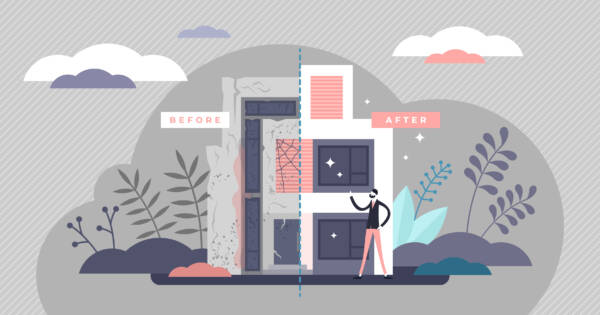Buying your first home can be a daunting task. It’s not only a major life milestone but a financial one too. Making matters worse, soaring prices and stagnant wages have made it more difficult for millennials to enter the real estate market. Much harder than it was for their parents’ generation, at least. However, that doesn’t mean it’s impossible. If you have a stable household income and a debt situation that’s under control, you’re already on solid footing to buy a house.
Given this is probably the biggest investment you’ll ever make, it helps to be as financially prepared as possible. The journey of home ownership can be exciting, but also sometimes confusing or scary. To help get you there, here are ten important financial tips to follow for buying your first home.
Determine a Realistic Price Range
Step number one in the home ownership process is to figure out how much house you can actually afford. An easy way to do this is to make use of an online home affordability calculator. This tool will determine your price range by taking household income, monthly debts, and savings into account.
Once you have a budget established, it’s important to keep that figure in mind when it comes time to apply for a mortgage loan. A lender may give you a loan that’s at (or even above) your price ceiling. The problem is if you purchase a home at the top end of your budget, you may be stretched thin on other expenses. You need to factor in things like property taxes, homeowners insurance, and other costs not factored into the regular mortgage payment. For this reason, it’s best to look at properties that are listed under your budget. That leaves you some financial cushion if the price is driven up in a bidding war.
Don’t Rush
Piggybacking off the previous point, it’s important to keep a clear head when shopping around for your first home. More than likely, home ownership will be your biggest financial commitment. You’ll want to make sure you do it right. If you’re shopping in a competitive real estate market where inventory is limited, it will be that much harder to avoid making rash decisions.
For instance, if there are multiple offers on a house you’re really attached to, it can be tempting to make a high-priced offer to give yourself the best shot of winning. Unfortunately, all this does is saddle you with a house you can’t afford. It’s better to let an overpriced home you love go than become house poor the moment you move in. Take the loss and move on. You’ll find a house that fits your needs and budget eventually!
Check Your Credit
Your credit score plays a vital role in your ability to get approved for a mortgage loan. Therefore, it’s a wise financial move to make sure your credit is as healthy as possible when you submit an application. For a conventional loan, you’ll generally need a FICO score (a type of credit score created by the Fair Isaac Corporation) of 620 or higher. If you have a higher credit score (740 and above), you’ll benefit from some of the lowest interest rates lenders have to offer.
If your score is below 620, you may still qualify for a loan. However, keep in mind that you’ll likely be saddled with a high interest rate and need to make a larger down payment. The good news is you don’t have to wait for a lender to tell you your credit score, as you can easily get a free credit report online.
Secure a Pre-Approval Letter
When it comes to getting a mortgage, qualifying for a loan is much different than actually being approved. It’s easy to confuse the two terms, as lenders are more than happy to pre-qualify applicants. Unfortunately, a pre-qualification only provides an estimate of how much a lender would be willing to give you based on your income and debts. This is a good first step in your home ownership journey, as a pre-qualification will give you a ballpark idea of what kind of home you’ll be able to afford. However, once it’s time to start making offers, you’ll want to make sure you have an actual pre-approval in hand.
With a pre-approval, a lender will thoroughly review your finances and confirm in writing how much they’re willing to lend you. This is important. It not only provides a concrete confirmation of a loan but will indicate to a seller that you’re taking things seriously. Given how competitive the real estate market can be, a pre-approval can give you a serious advantage over other buyers who may not have taken this step yet.
Shop Around for the Best Interest Rate
Let’s say you take the steps listed above. You check your credit score, apply for a mortgage loan, and receive a pre-approval. All set to make an offer, right? Not so fast. You wouldn’t purchase a car (or other big purchase) without shopping around first. So why would you take the first mortgage quote offered to you?
According to the Consumer Protection Financial Bureau, comparing mortgage rates from at least three lenders can save you more than $3,500 over the first five years of your loan. Once you have several quotes in hand, start comparing rates and fees. Believe it or not, less than 25% of homebuyers actually do this. That means that the majority are potentially leaving the best deals on the table. Don’t make the same mistake!
Take Advantage of Open Houses
No matter what stage of the home buying process you’re at, open houses are an excellent opportunity to attain a lot of free, useful information. You’ll get a feel for what kinds of homes are for sale in your area and what they are selling for. It’s also a great, no-pressure way to make connections. You can introduce yourself to listing agents and get their contact information.
Another benefit that often goes overlooked is that you’ll be able to gauge how competitive the local market is. You can gauge that by seeing how much foot traffic the open house receives. Use your time in open houses to get a feel for the house and ask lots of questions. Remember, there’s no limit on the amount of open houses you can attend!
Save for a Down Payment
This is one of the big frustrations of entering the housing market for the first time. Unlike current homeowners, you won’t have any equity built up from your previous home to put towards a down payment on a new one. This means you’ll need to use your own personal savings to pay for the down payment on your first home. That can be asking a lot of first-time buyers. While you can sometimes get away with a down payment as low as 3% of the sale price, going this route can come back to bite you financially.
You should aim to put at least 20% down if you want to avoid mortgage insurance and paying considerably more interest over the life of the mortgage. There are many steps you can take to start building a down payment, including using a budgeting app, cutting budget expenses, setting aside tax refunds and work bonuses, and making extra money on the side.
Budget for Closing Costs
A common mistake among first-time home buyers is not factoring closing costs into their budgets. Closing costs are fees paid at the closing of a real estate transaction. They include things like home appraisals, title searches, and completing mortgage paperwork.
Generally, closing costs run between 2% and 5% of your loan amount. Depending on your financial situation, these costs could make or break your purchase altogether. To help defray these costs, you can try asking the seller to pay for a portion of them. Or talk to your broker about first-time home buyer incentive programs (more on these below).
Look Into Assistance Programs
The real estate market depends on new buyers being able to enter the playing field. Thankfully, there are a variety of assistance programs available for first-time buyers. In Canada, there’s the First-Time Home Buyer Incentive, which helps new homeowners reduce their monthly mortgage payments. The Canadian government also allows new buyers to borrow up to $35,000 from their RRSP for a down payment, tax-free.
In the US, the federal government offers a variety of assistance programs. One option is an insured loan from the Federal Housing Administration (FHA) that make it easier for first-time buyers to qualify. There are also state, county, and municipality-specific assistance programs. You can also take money from certain retirement funds to help pay for a house, without taking a tax hit. Make sure to contact your state housing finance agency to see what’s available in your area.
Don’t Be Afraid to Negotiate
As a first-time home buyer, it’s easy to feel overwhelmed by the whole process. You might feel like you have no say when it comes to price or mortgage rates. However, real estate is an industry that has flexibility practically baked into it. That means there is actually a lot of room to negotiate on house prices — even if you’re a newbie!
Your real estate agent is a valuable asset in this process. However, you need to remember that you can’t just assume they’ll automatically advocate on your behalf. “The agent’s incentive is to have the deal go through, not to get their client the best deal they can,” explains Zoe Chance, a professor at Yale School of Management who researches influence and negotiation skills.
If you’re shopping in a buyer’s market, sellers are more likely to be receptive to your cost-cutting requests. You might be able to negotiate lowering the listed price, covering closing costs, or even throwing in furniture and appliances. The worst thing a seller can say is no! Being afraid to negotiate is no reason to leave major savings on the table.
 Shutterstock
Shutterstock







